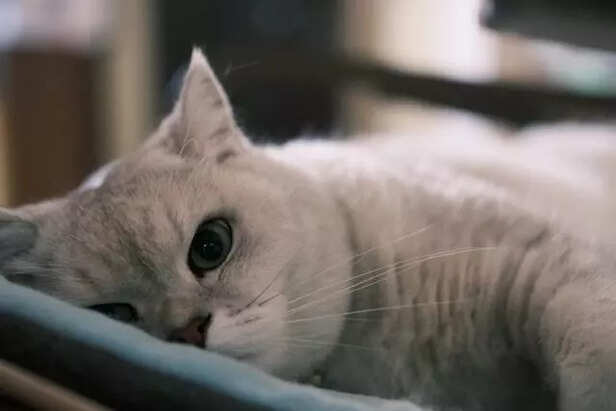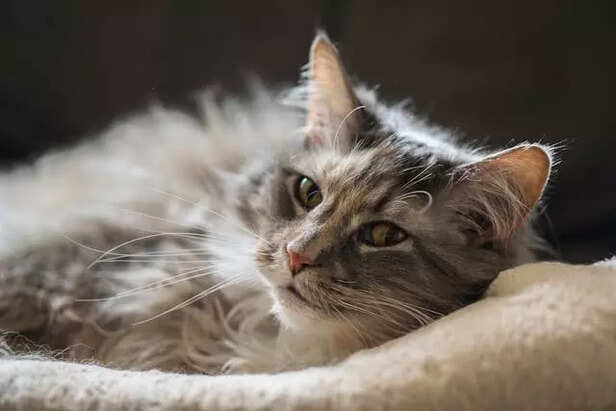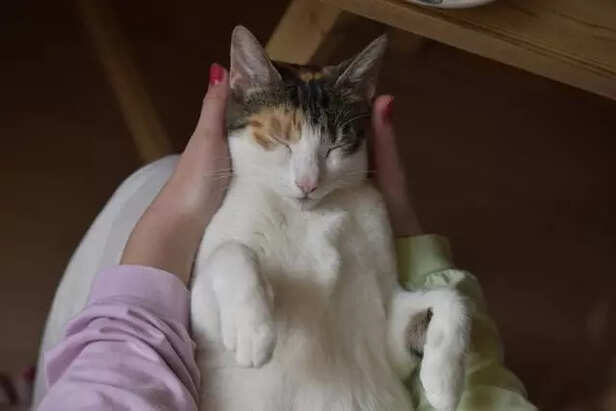If Your Cat Suddenly Stops Eating, Read This Before It’s Too Late
Tanisha Kumari | Sep 05, 2025, 16:43 IST
Cats' refusal to eat
( Image credit : Freepik )
When a cat suddenly refuses food it is often more than simple fussiness. It can signal stress, dental pain, stomach upset or even serious illness. Each breed has unique risks that may affect appetite. Acting quickly is vital. Learn why your cat is not eating, what you can do, and when it is time to call the vet.
Cats are known for being picky eaters but if your cat suddenly stops eating completely then this can be a very serious problem. A cat can go a short time without food but if they refuse meals for more than a day or two their body can weaken fast. Many cat owners think their pet will eat when hungry but unlike dogs cats can become sick very quickly if their stomach stays empty.
Sometimes the reason is small like boredom with the same food. Other times it can mean an illness hiding inside and that is why you should never ignore this change. Watching how your cat behaves in these moments can give you the first sign that something deeper is wrong.
A cat that suddenly ignores food may also become weak or tired. You may see less playfulness or even notice your cat losing some weight. Because cats hide their sickness well it is important to treat food refusal as a clear message.
Common Health Problems That Stop Cats from Eating

One of the top reasons is dental pain like cats with sore teeth or gums often avoid food because chewing hurts them and another reason can be upset stomach caused by hairballs or infections. Kidney disease is also common in older cats and it can take away their desire to eat.
Even stress can lead a cat to stop eating. A change in the environment can upset a cat more than we think and some cats feel emotional stress so deeply that they lose their appetite until they feel safe again.
If your cat is vomiting often or has diarrhea with no interest in food it may be a warning sign and waiting too long can make recovery harder so it is best to talk to a vet without delay.
Why Cat Breeds React Differently to Eating Problems

Not all cat breeds react the same way when it comes to food refusal as some cats are hardy and may bounce back with small changes while others are very sensitive and even a small upset can keep them away from meals for days.
Persian cats are known for their flat faces and may develop breathing or dental problems and these can affect the way they eat. They may avoid food if chewing feels uncomfortable. Siamese cats are alert and active but they are known for sensitive stomachs and they may show fast reactions to minor diet changes.
Maine Coons are large cats with strong bodies but they are also prone to heart problems. A sudden refusal to eat with this breed can mean a serious underlying health issue. British Shorthairs are calm and solid but also easily gain weight. If they stop eating it may shock the system since they are usually steady feeders.
If a cat avoids food for more than 24 to 48 hours it can lead to a dangerous condition called fatty liver disease. This happens when fat builds up in the liver because the cat is not eating. It can become life threatening in only a few days.
Kittens are even more at risk. A small kitten that refuses food can quickly get dehydrated. Their little bodies do not have energy storage like adult cats. It is important to act very quickly if it is a kitten.
Older cats may also struggle more if they stop eating. Their body may already be weak and skipping meals can make their health decline faster. Both young and senior cats need close attention when mealtime suddenly changes.
What You Can Do Right Away

First check if there is a simple reason like spoiled food or a dirty bowl. Sometimes changing to a fresh dish of wet food can solve the issue. If that does not help warm the food slightly to make it smell stronger. Cats eat more when the aroma feels inviting.
Try placing the bowl in a quiet corner of the home. Some cats avoid food if they feel noise or disturbance. A calm feeding spot can make them feel safe and willing to eat again. Also check if the litter box is normal. If you notice no stool or urine with no food intake then reach a vet quickly.
One should never try to force feed their cat without guidance as this can cause stress or even choking. The safest choice is always to have a vet examine and guide you as they can test for hidden illnesses and suggest special diets if needed.
A cat refusing food is never a small matter. While sometimes it is only stress or food boredom it can also be the first sign of illness. Each cat breed has its own weak points so every pet parent should learn the risks linked to their cat’s bloodline. The key is to notice changes fast and react quickly.
If your cat suddenly stops eating the kindest step you can take is to act without delay and a quick visit to the vet can be the line between quick recovery and a serious problem. Every mealtime skipped is a message from your cat and your response today can protect them for many more years of love and play.
Discover expert advice and the latest tips on pet care, training, health, and more. Stay updated with all things pets at Times Pets!
Frequently Asked Questions (FAQs)
Sometimes the reason is small like boredom with the same food. Other times it can mean an illness hiding inside and that is why you should never ignore this change. Watching how your cat behaves in these moments can give you the first sign that something deeper is wrong.
A cat that suddenly ignores food may also become weak or tired. You may see less playfulness or even notice your cat losing some weight. Because cats hide their sickness well it is important to treat food refusal as a clear message.
Common Health Problems That Stop Cats from Eating

Reason behind this phenomenon
( Image credit : Unsplash )
One of the top reasons is dental pain like cats with sore teeth or gums often avoid food because chewing hurts them and another reason can be upset stomach caused by hairballs or infections. Kidney disease is also common in older cats and it can take away their desire to eat.
Even stress can lead a cat to stop eating. A change in the environment can upset a cat more than we think and some cats feel emotional stress so deeply that they lose their appetite until they feel safe again.
If your cat is vomiting often or has diarrhea with no interest in food it may be a warning sign and waiting too long can make recovery harder so it is best to talk to a vet without delay.
Why Cat Breeds React Differently to Eating Problems

Maine coons
( Image credit : Pexels )
Not all cat breeds react the same way when it comes to food refusal as some cats are hardy and may bounce back with small changes while others are very sensitive and even a small upset can keep them away from meals for days.
Persian cats are known for their flat faces and may develop breathing or dental problems and these can affect the way they eat. They may avoid food if chewing feels uncomfortable. Siamese cats are alert and active but they are known for sensitive stomachs and they may show fast reactions to minor diet changes.
Maine Coons are large cats with strong bodies but they are also prone to heart problems. A sudden refusal to eat with this breed can mean a serious underlying health issue. British Shorthairs are calm and solid but also easily gain weight. If they stop eating it may shock the system since they are usually steady feeders.
When Food Refusal Becomes Very Serious
Kittens are even more at risk. A small kitten that refuses food can quickly get dehydrated. Their little bodies do not have energy storage like adult cats. It is important to act very quickly if it is a kitten.
Older cats may also struggle more if they stop eating. Their body may already be weak and skipping meals can make their health decline faster. Both young and senior cats need close attention when mealtime suddenly changes.
What You Can Do Right Away

Visiting a vet
( Image credit : Unsplash )
First check if there is a simple reason like spoiled food or a dirty bowl. Sometimes changing to a fresh dish of wet food can solve the issue. If that does not help warm the food slightly to make it smell stronger. Cats eat more when the aroma feels inviting.
Try placing the bowl in a quiet corner of the home. Some cats avoid food if they feel noise or disturbance. A calm feeding spot can make them feel safe and willing to eat again. Also check if the litter box is normal. If you notice no stool or urine with no food intake then reach a vet quickly.
One should never try to force feed their cat without guidance as this can cause stress or even choking. The safest choice is always to have a vet examine and guide you as they can test for hidden illnesses and suggest special diets if needed.
A cat refusing food is never a small matter. While sometimes it is only stress or food boredom it can also be the first sign of illness. Each cat breed has its own weak points so every pet parent should learn the risks linked to their cat’s bloodline. The key is to notice changes fast and react quickly.
If your cat suddenly stops eating the kindest step you can take is to act without delay and a quick visit to the vet can be the line between quick recovery and a serious problem. Every mealtime skipped is a message from your cat and your response today can protect them for many more years of love and play.
Discover expert advice and the latest tips on pet care, training, health, and more. Stay updated with all things pets at Times Pets!
Frequently Asked Questions (FAQs)
- Is it normal for kittens to miss meals?
No, kittens have small bodies and need food often so a kitten refusing food can get sick very quickly so get vet help right away. - How to tell if a cat is in pain?
Some signs of pain in cats to look out for can be reluctance to be touched or handled, toileting outside their litter box or showing a lack of interest in playing or going outside. - How do cats lie when in pain?
When cat is in pain, they lay down while keeping their legs tucked up underneath her instead of stretching out on their side.
